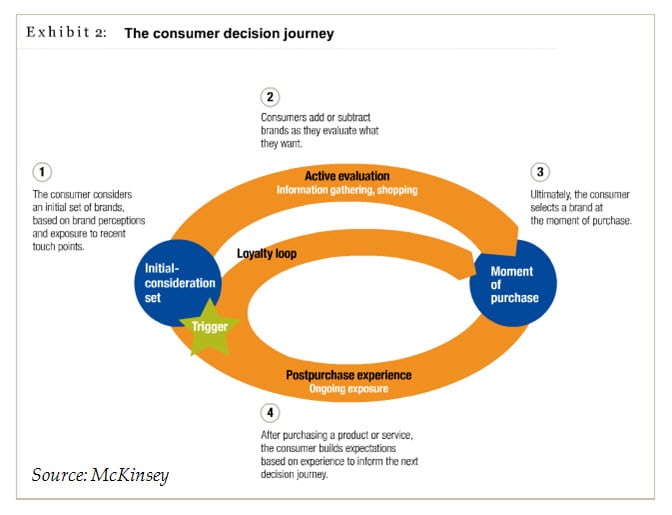McKinsey: Shooting holes in the "Sales Funnel"
August 12, 2009

The latest McKinsey Quarterly carries a great article on the consumer decision journey - and shoots holes in the now outdated “sales funnel” metaphor. Whilst the piece focuses primarily on B2C buyer behaviour, our own observations suggest that many of the principles are equally relevant to the process of B2B buying.
The authors explain that the linear process concept implied by the “sales funnel” – although attractively (and deceptively) simple – no longer reflects the complexities of today’s customer decision journeys. It fails to capture the many touch points and two-way interactions that are a consequence of an increasingly well-informed, networked and discerning prospect community.
Ease of access to internet information, and the increasing importance of word of mouth, recommendation and reputation in the B2B buying process has transferred information power into the hands of the prospect. It’s no longer unusual for the group of potential solutions being considered to expand, rather than narrow, at some stage in the decision journey before the choice of what (or if) to buy is made.
Trigger Events
McKinsey highlight the importance of trigger events – something we’ve written about before – that kick-start the customer decision journey in the first place. As we’ve pointed out, in the world of B2B, these trigger events can be internal to the organisation (such changes in staff, responsibilities or circumstances) or external to the market (such as major changes in technology, legislation or the balance of competition).
At first the prospective buyer may either be unaware or unconcerned – but then something happens (the trigger event) to raise their awareness that they have an issue that they need to deal with – and the search for a solution gets underway. McKinsey see the B2C process as a circular, rather than a linear journey, with four potential battlegrounds where marketers can win or lose: initial consideration, active evaluation, closure through purchase, and post-purchase.

These are closely analogous to the four key stages we have identified in the B2B customer decision journey: get connected, get considered, get chosen and get recommended. McKinsey point out that once they have defined an initial vendor consideration set, consumers then tend “shop a category” which may result in additional vendors being included in their evaluation – exactly the behaviour we have observed in B2B, and highlighting the critical importance of being found in the right categories when prospects start searching for solutions.
At each stage in their respective buying processes, both B2C and B2B customers face the choice of continuing, pausing or abandoning their decision-making journey, and adding, continuing with or subtracting vendors from consideration. Prospects of both types seem to have a strong preference for “pulling” the information they need to make these decisions rather than having it pushed at them by vendors, and to place greater trust in third party validation than in vendor messaging.
B2Both
So, although the McKinsey survey focused only on B2C behaviour, we should not be surprised to observe similar things happening in B2C, or to find that McKinsey’s recommendation – that vendors align their marketing efforts with the customer decision journey – are equally relevant to the world of B2B sales and marketing.
We’ll be publishing a series of connected blogs over the coming weeks, but I’m interested in your perspective – what can we as B2B marketers learn from this study? What other parallels have you observed?
One more thing
You might like to try our 10-minute on-line sales best practices benchmark, which reflects some of the latest published learning from McKinsey, Miller-Heiman and the Aberdeen Group. You can take the test here.
p.s., if you found this article interesting, why not subscribe to our blog?


Comments